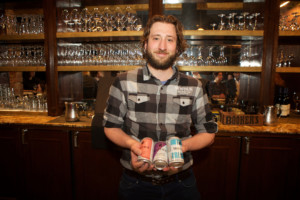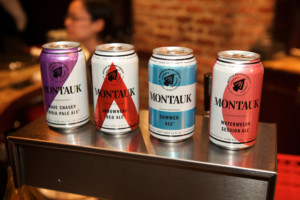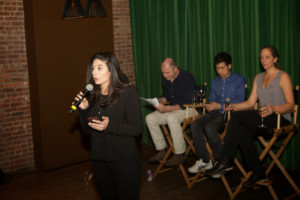
In the opening to his 2011 book, American Wasteland: How America Throws Away Nearly Half of Its Food (and What We Can Do About It), Jonathan Bloom writes that America wastes enough food to fill the Rose Bowl each day. The issue of food waste has only grown in public consciousness since then and was the main topic at our Feeding NYC by Reducing Restaurant Waste event on Monday, March 27.
TouchBistro co-hosted the evening and our own editor in chief Brian Halweil moderated a panel of food waste experts including Kate MacKenzie (senior director for programs at City Harvest), Tony Vu (founder and CEO of MintScraps) and Marcel Van Ooyen (president and CEO of GrowNYC).
Kate Mackenzie began by sharing that City Harvest will rescue 55 million pounds of food this year. Despite this impressive figure, Van Ooyen stated that the amount of food wasted in New York is astronomical. “Our schools alone are serving one million meals each day,” he remarked. He conceded that “challenges are vast” but emphasized that there was reason to remain optimistic. “At GrowNYC we believe every act by an individual adds up to a big change by everyone,” he encouraged. Suggestions for small individual acts? Consumers should buy the ugly produce at farmers markets and chefs should adopt the “tip to tail” ethos of animal butchery.
Vu who founded Mintscraps in 2013 did so because of a lack of “great tools to help food businesses, restaurants and hotels easily measure and quantify food waste.” Mintscraps, an online platform that does just that, is in the process of onboarding 50 food businesses from New York, San Francisco and Thailand. His innovation has recently caught the attention of celebrity chef Mario Batali.
In New York, policy that mandates large restaurants must compost their organic waste and new technology are contributing to the early stages of progress, but there are barriers. Infrastructure, Van Ooyen noted, is one of them. He encouraged restaurant designers to start thinking about areas for food scrap storage and space to hold leftover food that can be donated. All three panelists agreed that while restaurant waste is a major issue, it’s not any one sector’s fault. Mackenzie affirmed this point noting that “the most food waste in this country happens in our homes at the consumer level,” but small, easy steps we can all take will effect big change.
































